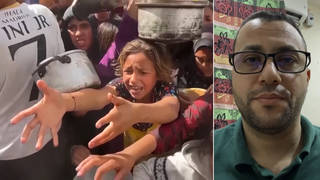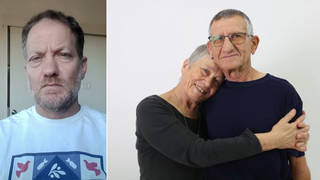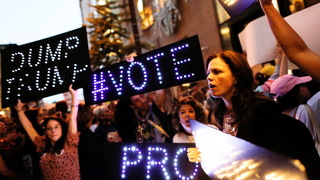
On Saturday, tens of thousands of people descended on Washington, D.C., for the first-ever March for Science. Among those who took to the stage were a number of young aspiring scientists, as well as LGBT speakers, people of color and disabled scientists.
Transcript
AMY GOODMAN: Hundreds of thousands of people came out on every continent for the March for Science. We were in D.C. for a special 5-hour broadcast. These are some more of the voices. We’ll begin with the young people on the stage.
KAVYA KOPPARAPU: So, I want to ask you guys a few questions. Do you shop online at Amazon? Do you use Google at least 10 times a day? Do you share pictures on Instagram? Well, all of these technologies would not be possible without computer science. Computer science is the backbone of all the technology that we use today.
My name is Kavya Kopparapu. I’m 16 years old, and I’m a junior at Thomas Jefferson High School for Science and Technology. And I’m here today for the future of computer science.
Computer science is at the forefront of every field. So why don’t we have an emphasis on computer science education? Only 40 percent of our schools offer computer science, which means—you do the math—we’re missing 60 percent of our future Bill Gates, future Mark Zuckerbergs and future innovation. To compete as a country, we need to compute. Without computer science, our economy would come to a halt. Innovation in medicine would cease. Our space program would not exist. Like, hope for a greener future would be crushed. Computer science is the foundation for the future. It’s a future of robotic surgeries, driverless cars, artificial intelligence, virtual reality.
And women should be the driving force of this future innovation. Computer science is for all. That’s why I founded GirlsComputingLeague. It’s a nonprofit that empowers girls to pursue computer science in middle and high school. We need more girls in computer science. We need more diversity in computer science. In my future career, I don’t want to be known as a girl that happens to be a computer scientist; I want to be known as a computer scientist that happens to be a girl. Today, I am marching for computer science to be for all ages, all genders and all races. Today, I am marching for computer science for all. Thank you.
TAYLOR RICHARDSON: Hi, my name’s Taylor Richardson, and I live in Jacksonville, Florida. I am 13 years old, and I’m not just a black girl who’s interested in STEM, but I’m a black girl who rocks STEM. I will be—I will be an engineer, a scientist and an astronaut and will eventually go to Mars.
I’m marching because I want all girls, especially girls of color, to know that they can be a part of STEM and even be leaders in STEM. But like Muhammad Ali said, you better get used to me. Yes, you better get used to us girls and women, because we’re not going anywhere. Science is not a boys’ game, it is not a girls’ game—it’s an everyone’s game. I want girls to know we can educate each other and advocate for legislation to support sciences—science and engage others in our community.
I stand here on the shoulders of giants: mathematician Katherine Johnson, who helped us go to the moon; rocket scientist Annie Easley; Dr. Mae Jemison, the first African-American woman in space—and won’t be the last. Thank you.
DR. CAROLINE SOLOMON: [interpreted] Hello, everybody. My name is Dr. Caroline Solomon, and I am a biologist. I got spinal meningitis when I was 15 months old. I am lucky to be alive today, and I have science to thank for that. The vaccine for that disease was developed after I had the disease. The only impact on my life was that I got deaf.
I am thrilled to be here today in honor of science. We are celebrating science, and we are celebrating the fact that everyone brings their own unique perspective to how we do science. Deaf people are visual learners. There are studies being done right now by deaf scientists on bird songs. They’re not listening to the songs. They’re looking at visual readouts on computer screens and studying the songs through visual technology. That’s the kind of impact that deaf scientists can have on our world.
DR. JESSICA WARE: Hello. My name is Dr. Jessica Ware, and I’m here representing Rutgers University, Newark, and I’m a member of the Anthropological Society of America. I’m an evolutionary biologist and an entomologist. Evolution—yeah! Evolution!
Evolutionary biology and entomology, which is the study of insects, are disciplines for everyone. I’m a single mom to two children. I’m a black female punk rocker with an LGBT family. My son and my identical twin are transgender. And I belong here. I belong in science. I’m part of a global community of entomologists and evolutionary biologists.
The study of insects is, by definition, international, global and collaborative. Insects don’t see borders, and they can cross walls. The Anthropological Society of America is the largest insect science organization in the world. And we seek to improve the lives of the world’s citizens by promoting biological diversity and developing safer food production. We’re working to save pollinators while limiting pests and vectors of disease. We need to fund integrated pest management, which is an aspect of entomology that ensures food safety for humanity. Entomology is a vital science. And we seek to unravel past and current patterns of biodiversity, and mediate threats to human health, like Zika, malaria, dengue, yellow fever and chikungunya. Evolutionary biologists seek to understand which species are found where and why. And we need to continue to fund evolutionary study through the maintenance and growth of natural history collections and museums, through funding field expeditions to go out and describe new species before they go extinct.
KELLAN BAKER: Hi, everybody. My name is Kellan, and I’m here representing public health. When I say “public,” you say “health.” Public!
AUDIENCE: Health!
KELLAN BAKER: Health! Public!
AUDIENCE: Health!
KELLAN BAKER: Health! Yes! Woo!
We all know that science is about data. But we need to remember that data tells stories. We all have a story. My story is that I’m a public health geek and a policy wonk. I’m also a queer transgender man. And science makes—helps make sure my community and I are counted and we count in decisions that affect our lives. Science is about all of us. It’s my friend Amy, a bench scientist who’s working to break new ground in the treatment of diabetes. Science is my mother, a citizen scientist who contributes the data from her backyard bird feeder, Cornell Lab of Ornithology. And science is my fellow Ph.D. students at the Johns Hopkins School of Public Health—woo!—who do research to inform policy decisions like the Affordable Care Act, to ensure we all have the right to good health.
But it’s not enough to collect data. We need to share it. “Advocacy” is not a dirty word. Science is objective, but science is not neutral. The poet Dante wrote that the hottest places in hell are reserved for those who remain neutral in times of moral crisis. We cannot pretend we are above the fray. Science is objective, but it’s not neutral. As scientists, as human beings, our mandate is clear. It’s for each of us to stand up for what we know to be true and to stand together when working to shape a future in which we can all thrive. Thank you! Public health!
SHAWN OTTO: I’m Shawn Otto, author of The War on Science. We are gathered here today to defend this fundamental principle, to tell our elected leaders that attacking science is attacking democracy, denying science is denying democracy, and rejecting science is rejecting democracy. The greatest freedom and the greatest equality come not from the PR campaigns of wealthy corporations, nor from the demands of impassioned ideologues, but from public policies based on evidence. So we say to our elected leaders, the war on science must end. The evidence shows that global warming is real, that vaccines do not cause autism, that research drives prosperity, that there are no such things as alternative facts, and that if you want America to succeed, Donald Trump, you can’t lead it with your brain tied behind your back.
DR. MARY JO ONDRECHEN: Hello, science lovers. And a special sekoh to all the members of the American Indian Science and Engineering Society, observers of nature, water protectors and defenders of Mother Earth. I’m Mary Jo Ondrechen, professor of chemistry at Northeastern University, a Mohawk and a scientist.
My research group and I work on interpreting the genome and on understanding how enzymes work. And where does this take us? To finding new ways to prevent and treat disease, to developing renewable energy systems, to designing new ways to make chemicals that are friendlier to the planet. We are also training our young people for the jobs of today and tomorrow. There is growing global demand for solutions in medical technology, clean energy, environmental protection, and biological and cyber threat detection. Innovations mean new industries and new jobs. The United States can and should be the world leader in these innovations. But this depends on investment today in scientific research and education, in the NSF and the NIH.
To all the students of science, maybe—maybe it’s discouraging to know that some of our national leaders today do not believe in what we, as scientists, are doing. But I promise you, we will prevail!
AMY GOODMAN: Just some of the voices from the March for Science in Washington, D.C.












Media Options